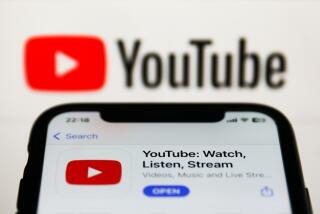YouTube anti-piracy plan: Give us videos you don’t want copied
- Share via
SAN BRUNO, CALIF. — To help keep their videos off YouTube, media companies may need to give their videos to YouTube.
YouTube parent Google Inc.’s long-promised method for reducing piracy, unveiled Monday, relies on TV networks, movie studios and other content owners to provide the video-sharing service with master copies of their videos.
YouTube won’t post those videos. Rather, it plans to use software to find unique characteristics in the clips so it can detect copies posted by YouTube users without permission. Media companies can ask Google to automatically delete every unauthorized copy -- or to slap ads on the clips and promote them.
“We really need the content community to work with us,” YouTube product manager David King said. “They need to help us help them.”
Google said it has tested the program with such major media companies as Walt Disney Co. and Time Warner Inc.
If successful, the program would reduce the burden currently placed on content owners, which now have to scour YouTube and other video-sharing sites for pirated material so they can request its removal.
But some consumer groups complained Monday that the new technology could delete some online videos that use snippets of copyrighted works appropriately, for criticism, satire or education. Those so-called fair uses are protected by the Digital Millennium Copyright Act.
YouTube’s changes “will infringe on users’ rights and they will for sure chill speech,” said Gigi B. Sohn, president of advocacy group Public Knowledge.
YouTube said the system allowed for fair use of video material but declined to say how.
The website has long been at odds with some TV studios, music companies and others who argue that it built its huge following with help from purloined shows, videos and sports footage. Media giant Viacom Inc., England soccer’s Premier League and other content owners have sued Google, alleging copyright infringement.
In its defense, YouTube says that it has taken numerous steps to reduce copyrighted material appearing on its site without owners’ permission and that it follows the federal copyright act by removing improperly posted clips when asked to do so.
While Google was working on the technology, its relationship with some media companies eroded, Forrester Research analyst James McQuivey said.
“I’ll trust that the technology is hard to pull off,” McQuivey said. “But they should have introduced this in January or at least said this is our goal, rather than stand behind the Digital Millennium Copyright Act.”
The company hopes the video matching program, if successful, will change its relationship with potential partners in the media industry.
“This goes beyond what the law requires,” said Evan Cox, a partner at law firm Covington & Burling. “It’s a way they can get into relationships where they can charge more money for what they are doing and feel safe about it.”
The YouTube Video Identification program depends on media companies’ willingness to trust Mountain View, Calif-based Google with its content.
Storing copies of copyrighted works without permission got Google in trouble with book publishers in 2005. After the company began scanning books so it could display snippets of pages in its search results, a group of publishers and the Authors Guild filed copyright infringement lawsuits.
YouTube’s King would not say how accurate the video identifying technology had proven to be. He said that the more doctored the video, the harder it was to find. But he added that the technology was sensitive enough to match a newscast that was recorded by someone standing in front of a TV with a camera.
In recent tests, the technology was able to find 18 wrongfully uploaded videos belonging to one partner, Hearst-Argyle Television Inc.
“This is the beginning of being able to protect copyrighted video, and we’re happy to participate in any effort that could safeguard our content,” Terry Mackin, the TV company’s executive vice president and head of digital media, said in an e-mail.
Other media companies praised Google’s effort.
“We’re encouraged that they recognize the need to recognize copyright,” Time Warner spokesman Ed Adler said. “I’m told by our general counsel that there’s still some work to be done before we would say it’s totally sufficient to protect copyright, but we’re encouraged so far.”
He would not elaborate on what work needs to be done.
Notably absent from Google’s early partners is Viacom, which operates cable networks such as MTV and Comedy Central, as well as movie studios including Paramount Pictures.
Viacom in March filed a $1-billion copyright infringement lawsuit against Google. The media company says it spends as much as $200,000 a month to identify its content on YouTube and ask Google to remove it.
Viacom officials said that they wanted to see more details of the YouTube program but that the preliminary announcement seemed positive.
“They’re moving in the right direction,” Viacom general counsel Michael Fricklas said. “I commend them for that.”
Google shares fell $17.28, or 2.7%, to $620.11.
--
--
Times staff writer Thomas S. Mulligan contributed to this report.
More to Read
The biggest entertainment stories
Get our big stories about Hollywood, film, television, music, arts, culture and more right in your inbox as soon as they publish.
You may occasionally receive promotional content from the Los Angeles Times.










